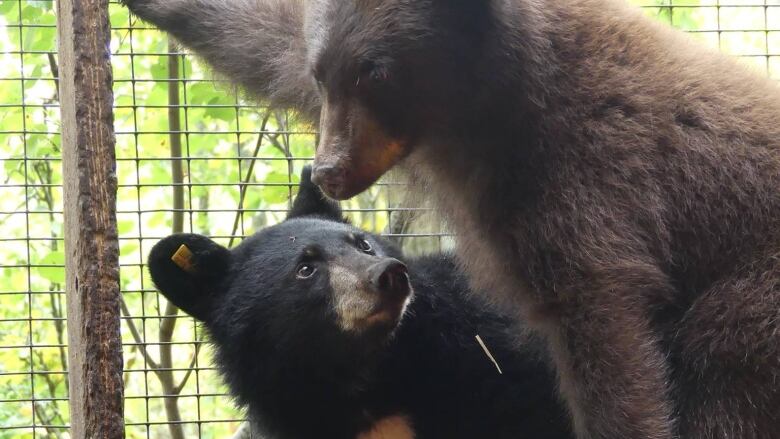Wildlife shelter seeks people to provide bear necessities as travel restrictions halt volunteers from abroad
Pandemic preventing foreign volunteers from helping care for animals at Northern Lights in Smithers, B.C.

Even in the middle of a pandemic, it's business as usual for a wildlife shelter in northern B.C. they're still rescuing animals, caring for them, and preparing to set them free.
But because of COVID-19 travel restrictions, the organizationdoesn't have enough people to do all the work that's required.
The Northern Lights Wildlife Society in Smithers, B.C., which has been in operation since 1989,sets aside 10 acres of enclosure space for rescued grizzly and black bears. At the moment,37 bears are currently waiting to be released from the shelter.
Typically, the society hosts two or three live-in volunteers, who in the past have come from all over the worldto help care for the bears throughout the summer.
But restrictions expected to last through the summer are preventing people from outside the country entering.
Without thatextra help, society manager Angelika Langen's family of five three of whom can only work select hours because they have full-time jobs have had to take on caring for the bears,which she said involves a lot of physical work.
Volunteers have tocollect logs, branches and grass daily for the bears to provide them with physical and mental stimulation, and people are constantly cleaning up after the animals. In addition, feeding preparation takes about two hours a day.
Critically, without help caring for the bears, Langen can't get them ready to be released back into the wild in a timely manner.She needs to organizetravel to the release sites, which can be all over the province and that, too, presents challenges during a pandemic.
"Lack of hotels, restaurants and actual travel restrictions make that difficult," Langen said.
Anyadditional time it will take to prepare the bears for release concerns Langen because it means they will spend more time around humans, habituating them to being around people.
"This time of year is when they usually leave their mothers, and their drive to do their own thing is really strong," Langen said.
The lack of help also means the shelter may have to limit the number of bears they take in over the summer.
"There's only so much a couple of people can do and care for so many animals," Langen said.
The shelter is asking locals who may be able to give a few hours of time, or become long-term volunteers, to consider helping out.
"They can come wash dishes or chop fruit. That gives us an hour to go on a rescue or do a release," Langen said.
With files from Nicole Oud












_(720p).jpg)


 OFFICIAL HD MUSIC VIDEO.jpg)
.jpg)



























































































